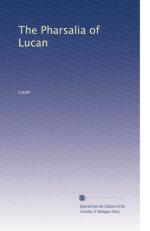|
This section contains 9,723 words (approx. 33 pages at 300 words per page) |

|
SOURCE: "The Meaning of the Pharsalia," American Journal of Philology, Vol. LXVI, No. 4, October, 1945, pp. 352-76.
In the following essay, Marti explores Lucan's twin intentions in the Pharsalia—giving new life to the epic and presenting the Stoic ideal.
In a brief but illuminating study Sikes has shown that the whole conception of the Pharsalia would have been different if Lucan had not been a Stoic, and that "commentators have strangely underrated the importance of philosophy as the chief—if not the only—cause of Lucan's complete break with epic convention."1 He points out the best approach to an understanding of the Pharsalia when he states that the absence of myth and the poet's attempt to explain the motives of human actions are based upon his philosophy. Sikes, however, is more interested in the cause of Lucan's failure to give the gods some place in his poetry, as...
|
This section contains 9,723 words (approx. 33 pages at 300 words per page) |

|


